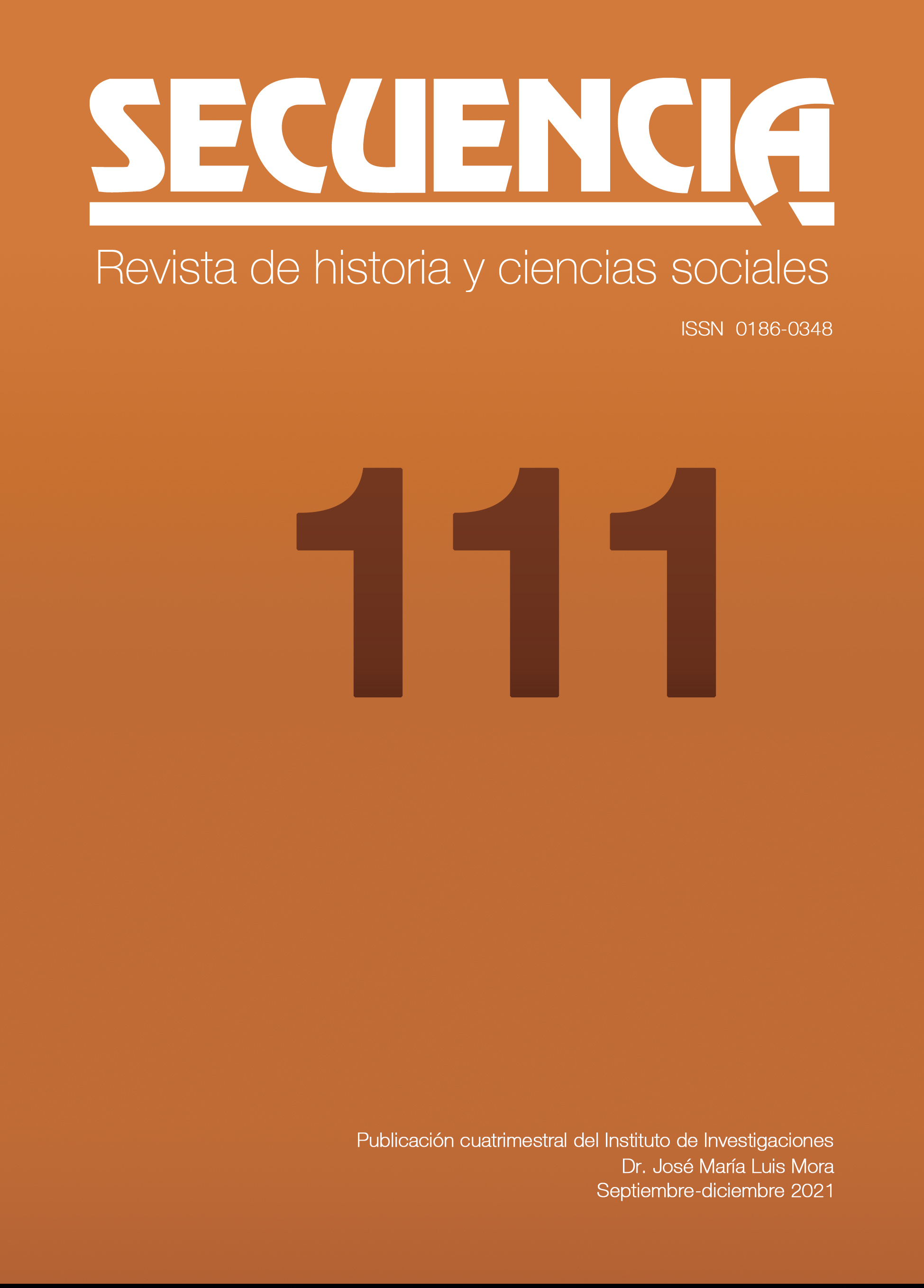Abstract
This paper explains unknown episodes in the history of the Latin American cold war. Specifically, the operations of USA religious diplomacy between the Chilean social networks and transnational evangelical networks, under the context of the war on hungry. The premise of promoting the leap to development in underdeveloped countries and of preventing breeding grounds for socialist revolutions in a significant decade for the cold war in Latin America, made neomalthusianism and family planning movements a reason for social, religious, and political mobilization for evangelical missionaries in Chile and Latin America. The work is based primarily on primary sources from the Harvard University Countway Library of Medicine, and on files and hearings of the United States Senate Committee on Population Crisis, as well as supplemented by press sources and secondary bibliography
References
Albuquerque, G. (2011). La trinchera letrada: Intelectuales latinoamericanos y guerra fría. Santiago: Ariadna.
Andes, S. (2014). The Vatican and catholic activism in Mexico and Chile: The politics of transnational catholicism, 1920-1940. Nueva York: Oxford University Press.
Bahamondes, L. (2020). Propuestas teóricas para la comprensión del pentecostalismo chileno: de la focalización de la pobreza en la pobreza a las propuestas culturalistas. En M. Mansilla y M. Mosqueira (ed.), Sociología del pentecostalismo en América Latina. Santiago: RIL Editores-Universidad Arturo Prat.
Bane, M. J. (2011). The churches, foreign policy, and global poverty: New approaches? New partnerships? Maryland: Center for International & Security Studies-U.
Bastian, J. P. (1995). Protestantes en Latinoamérica. Iglesia, pueblos y culturas, número monográfico América Latina, 37/38, 34-35.
Bastian, J. P. (2012). La modernidad religiosa: Europa Latina y América Latina en perspectiva comparada. México: Fondo de Cultura Económica.
Bauman, R. (2019). Fighting to preserve a nation’s soul: America’s ecumenical war on poverty. Athens: University of Georgia Press.
Brands, H. (2010). Latin America’s cold war. Cambridge: Harvard University Press.
Burch, J. (2017). The great society and the war on poverty: An economic legacy in essays and documents. California: ABC-CLIO.
Calandra, B. (2020). Il corpo del Caribe: Le politiche sulla riproduzione tra Puerto Rico e Stati Uniti (1898-1993). Verona: Ombre Corte.
Capdevielle, J. (2012). Hilvanando redes entre familias e iglesias evangélicas en contextos de pobreza en Córdoba, Argentina. Revista Austral de Ciencias Sociales, 23, 5-23. Recuperado de https://www.redalyc.org/articulo.oa?id=45928389001
Castro Arcos, J. (2017). Guerra en el vientre: Control de natalidad, malthusianismo y guerra fría en Chile (1960-1970). Santiago: Centro de Estudios Bicentenario.
Connelly, M. (2009). The cold war in the longue duree: global migration, public health and population control. En M. P. Leffler y O. A. Westad, The Cambridge History of the Cold War (vol. 3). Nueva York: Cambridge University Press.
(CEP) [Centro de Estudios Públicos] (2006). Estudio de opinión pública: los mapuche rurales y urbanos hoy. Santiago: CEP. Recuperado de https://www.cepchile.cl/estudio-de-opinion-publica-los-mapuche-rurales-y-urbanos-hoy-mayo-2006/cep/2016-03-04/094057.html
Cullather, N. (2010). The hungry world: America’s cold war battle against poverty in Asia. Cambridge: Harvard University Press.
Dobson, M. (2018). Protestants, peace, and the apocalypse: The USSR’s religious cold war, 1947-1962. Journal of Contemporary History, 53(2), 361-390.
Escobar, A. (2012). Encountering development: The making and unmaking of the Third World. Princeton: Princeton University Press.
Escobar, A. (2014). La invención del desarrollo. Popayán: Universidad del Cauca.
Fagley, R. (1960). The population explotion and christian responsibility. Nueva York: Oxford University Press.
Fediakova, E. (2003). Redes religiosas transnacionales: el pentecostalismo latinoamericano en la “era de información”. Ciencias Religiosas, 11, 47-60.
Fediakova, E., (2014). Estar menos en templo, más en la calle: transformación del espacio evangélico chileno, 1990-2012. Estudos Ibero-Americanos, 40(2), 240-257. Recuperado de https://www.redalyc.org/articulo.oa?id=134635319004
Fernández, M. (2016). Los hijos de las tinieblas son más sagaces que los hijos de la luz. Pensamiento político católico y marxismo en Chile, 1960-1964. Izquierdas, 28, 27-65. DOI: http://dx.doi.org/10.4067/S0718-50492016000300002
Fernández, M. (2017). La tierra no es el cielo, pero el cielo comienza aquí en la tierra: La cuestión del clericalismo en el campo político y el pensamiento católico chileno, 1960-1964. Historia, 50(1), 11-47. DOI: https://doi.org/10.7764/S0717-71942017000100001
Field, T., Krepp, S. y Pettinà, V. (2020). Latin America and the global cold war. Chapel Hill: The University of North Carolina Press.
Freeman, D. (ed.) (2012). Pentecostalism and development: Churches, NGOs and social change in Africa. Londres, UK: Palgrave Macmillan.
Freston, P. (2001). Evangelicals and politics in Asia, Africa and Latin America. Cambridge: Cambridge University Press.
Galeano, E. (2003). Las venas abiertas de América Latina. Madrid: Siglo XXI de España Editores.
Gall, N. (1972). Births, abortions, and the progress of Chile. American Universities Field Staff Reports. West Coast South America Series, 19(2). Washington.
Garrard-Burnet, V., Lawrence, M. y Moreno J. (ed.) (2013). Beyond the eagle’s shadow: New histories of Latin America’s cold war. Albuquerque: University of New Mexico Press.
Garrard-Burnett, V. (1998). Transnational protestantism. Journal of Interamerican Studies and World Affairs, 40(3), 117-125.
Garrard-Burnett, V. (ed.). (2020). The Oxford handbook of Latin American christianity. Oxford: Oxford University Press.
Gavin, F. y Lawrence, M. (2014). Beyond the cold war: Lyndon Johnson and the new global challenges of the 1960s. Nueva York: Oxford University Press.
Gilbert, J. y Spencer, D. (eds.). (2008). In from the cold: Latin America’s new encounter with the cold war. Durham N.C.: Duke University Press.
Giménez, V. (ed.) (2019). Ciencias sociales y teologías: los pobres y el pueblo en las teologías de la liberación en Argentina. En F. Mallimaci et al., La religión ante los problemas sociales: espiritualidad, poder y sociabilidad en América Latina (pp. 283-316). Buenos Aires: CLACSO, pp. 283-316.
Goodson, P. (1997). Protestants and family planning. Journal of Religion and Health, 36(4), 353-366.
Guerrero, B. (2005). De indio a hermano: pentecostalismo indígena en América Latina. Iquique: Universidad Arturo Prat.
Hall, J. (2019). Church, State and American evangelicalism: A political missiology for the poor. Mission Studies, 36(1), 84-104. DOI: https://doi.org/10.1163/15733831-12341619
Häring, B. (octubre, 1968). La crisis de la Encíclica: oponerse puede y debe ser un servicio de amor hacia el Papa, Mensaje, 17(173).
Harmer, T. (2011). Allende's Chile and the inter-American cold war. Chapel Hill: University of North Carolina Press.
Hausberger, B. y Pani, E. (2018). Historia global. Presentación. Historia Mexicana, 68(1), pp. 177-196. DOI: https://doi.org/10.24201/hm.v68i1.3640
Herzog, J. (2011). The spiritual‐industrial complex: America’s religious battle against communism in the early cold war. Nueva York: Oxford University Press.
Hull, D. (1994). Christian church women. Shapers of a movement. St. Louis Missouri: Chalice, Press.
Ilcan, S. y Lacey, A. (2011). Governing the poor: Exercises of poverty reduction, practices of global aid. Montreal: McGill-Queen’s University Press.
Keohane R. y Nye J. (1988). Poder e interdependencia: la política mundial en transición. Buenos Aires: Grupo Editor Latinoamericano.
Kirkendall, A. (2010). Paulo Freire and the cold war politics of literacy. Chapel Hill: University of North Carolina Press.
Labarca, E. (1968). Chile invadido: reportaje a la intromisión extranjera. Santiago: Editorial Austral.
Lahr. A. (2007). Millennial dreams and Apocalyptic nightmares: The cold war origins of political evangelicalism. Oxford: Oxford University Press.
Lalive, C. (1968). El refugio de las masas: estudio sociológico del protestantismo chileno. Santiago: Editorial del Pacífico.
Levine. D. (2014). Popular voices in Latin American catholicism. Princeton: Princeton University Press.
Linden, I. (2009). Global catholicism: Diversity and change since Vatican II. Nueva York: Columbia University Press.
Lunn, J. (2009). The role of religion, spirituality, and faith in development: A critical theory approach. Third World Quarterly, 30(5), 937-951. DOI: https://doi.org/10.1080/01436590902959180
Mansilla, M., Muñoz, W. y Orellana, L. (2014). Los dilemas comunitarios y étnicos y religiosos: las investigaciones antropológicas del pentecostalismo aymara y mapuche en Chile (1967- 2012). Estudios Atacameños, 49, 153-175. Recuperado de https://revistas.ucn.cl/index.php/estudios-atacamenos/article/view/51
Mansilla, M., Orellana, L. y Piñones, C. (2017). Las estrategias del pentecostalismo chileno frente a la pobreza. Un análisis del periodo 1909-1989. Anuario de Historia Regional y de las Fronteras, 22(1), 49-70. DOI: https://doi.org/10.18273/revanu.v22n1-2017002
Mansilla, M., Orellana, L., y Vélez-Caro, C. (2018). El cuerpo de la pobreza: belleza, fealdad y juventud femenina en la iglesia evangélica pentecostal de Chile (1925-1950). Revista Estudios Teológicos, 58(1), 195-210. DOI: http://dx.doi.org/10.22351/et.v58i1.3007
Maoz, Z. y Henderson A. (2020). Religion and international cooperation. En Scriptures, shrines, scapegoats, and world politics: Religious sources of conflict and cooperation in the modern era. Michigan: University of Michigan Press.
Marshall, K. (2001). Development and religion: A different lens on development debates. Peabody Journal of Education, 76(3/4), 339-375.
Martínez Lillo, P. y Rubio, P. (ed.) (2015). América Latina y tiempo presente. Historia y documentos. Santiago: LOM Ediciones.
Mor, J. (2013). Human rights and transnational solidarity in cold war Latin America. Wisconsin: University of Wisconsin Press.
Moulian, R. (2005). Mutaciones, convergencias y paradojas en el lepún y el culto pentecostal. La contraparte de la reflexividad ritual. Redes.com. Revista de Estudios para el Desarrollo Social de la Comunicación, 2, 113-134. Recuperado de https://dialnet.unirioja.es/servlet/articulo?codigo=3661080
Muehlenbeck, P. (2012). Religion and the cold war: A global perspective. Nashville: Vanderbilt University Press.
Necochea, R. (2008). Priests and pills: Catholic family planning in Perú, 1967-1976. Latin American Research Review, 43(2), 34-56. Recuperado de http://www.jstor.org/stable/20488128
Necochea, R. (2014). Gambling on the protestants: The Pathfinder fund and birth control in Peru, 1958-1965. Bulletin of the History of Medicine, 88(2), 344-371. DOI: https://doi.org/10.1353/bhm.2014.0043
Niño, A. (2013). Guerra fría y propaganda. Estados Unidos y su cruzada cultural en Europa y América Latina. Madrid: Editorial Siglo XXI.
Pereira, J. y Ángel, J. L. (2009). A Chilean faith-based NGO’s social service mission in the context of neoliberal reform. En T. Hefferan, J. Adkins y L. Occhipinti (eds.), Bridging the gaps: Faith-based organisations, neoliberalism and development in Latin America and the Caribbean (pp. 213-229). Lanham: Lexington Books.
Pereira, M. (1996). El pentecostalismo: nuevas formas de organización religiosa en los sectores populares. Origen, evolución y funciones en la sociedad colombiana. 1960-1995. Historia Crítica, 12, 43-68.
Pettinà, V. (2018). Historia mínima de la guerra fría en América Latina. México: El Colegio de México.
Purcell, F. (2014). Connecting realities. Peace corps volunteers in South America and the global war on poverty during the 1960s. Historia Crítica, 53. DOI: https://doi.org/10.7440/histcrit53.2014.06
Ramos, F. y Castro Arcos, J. (2014). La Alianza para el Progreso en Chile y Venezuela, 1961-1963. Tiempo y Espacio, 24(62). Recuperado de http://ve.scielo.org/scielo.php?script=sci_arttext&pid=S1315-94962014000200006&lng=es&nrm=iso
Reed, L. (2008). A garden of paradise: History of El Vergel. USA: Author House.
Rivarola, A. (2019). The geopolitics of the catholic Church in Latin America. Territory, Politics, Governance, 9(3), 455-470. DOI: https://doi.org/10.1080/21622671.2019.1687326
Robertson, T. (2012). The malthusian moment. Global population growth and the birth of American environmentalism. New Brunswick: Rutgers University Press.
Rogers, E. (1965). Poverty on a small planet: A christian looks at living standards. Nueva York: McMillan.
Salinas, M. (1987). Historia del pueblo de Dios en Chile. La evolución del cristianismo desde la perspectiva de los pobres. Santiago de Chile: Ediciones Rehue/CEHILA.
Salvatore, R. (1998). The enterprise of knowledge: Representational machines of informal empire. En J. Gilbert, C. LeGrand y R. Salvatore (eds.), Close encounters of empire: Writing the cultural history of U.S.-Latin American relations. Durham: Duke University Press.
Scheer, C., Fountain, P. y Feener M. (eds.) (2018). The mission of development: Religion and technopolitics in Asia. Leiden: Brill.
Scheper, J. y Campos, M. (2016). Spirits, bodies, and structures: Religion, politics, and social inequality in Latin America. Latin American Perspectives, 43(3). DOI: https://doi.org/10.1177/0094582X16639237
Smith, C. (1991). The emergence of liberation theology: Radical religion and social movement theory, Chicago: The University of Chicago Press.
Somma, N., Bargsted, M. y Valenzuela, E. (2017). Mapping religious change in Latin America. Latin American Politics and Society, 59(1), 119-142. DOI: https://doi.org/10.1111/laps.12013
Taffet, J. (2007). Foreign aid as foreign policy: The alliance for progress in Latin America. Nueva York: Routledge.
Tyndale, W. (2001). Poverty and development: Has religion a contribution to make? Commentary: International Movement for a Just World, 1(2), 1-5.
Vaidyanathan, B. (2019). Mercenaries and missionaries: Capitalism and catholicism in the global south. Ithaca: Cornell University Press.
Wallace, J. (2013). A religious war? The cold war and religion. Journal of Cold War Studies, 15(3), 162-180.
Westad, O. (2018). La guerra fría. Una historia mundial. Barcelona: Galaxia Gutenberg.
Aquellos autores/as que tengan publicaciones con esta revista, aceptan los términos siguientes:
- Los autores/as conservarán sus derechos de autor y garantizarán a la revista el derecho de primera publicación de su obra, el cuál estará simultáneamente sujeto a la Licencia de reconocimiento de Creative Commons Atribución-NoComercial 4.0 Internacional que permite a terceros compartir la obra siempre que se indique su autor y su primera publicación esta revista.
- Los autores/as podrán adoptar otros acuerdos de licencia no exclusiva de distribución de la versión de la obra publicada (p. ej.: depositarla en un archivo telemático institucional o publicarla en un volumen monográfico) siempre que se indique la publicación inicial en esta revista.
- Se permite y recomienda a los autores/as difundir su obra a través de Internet (p. ej.: en archivos telemáticos institucionales o en su página web) antes y durante el proceso de envío, lo cual puede producir intercambios interesantes y aumentar las citas de la obra publicada. (Véase El efecto del acceso abierto).




